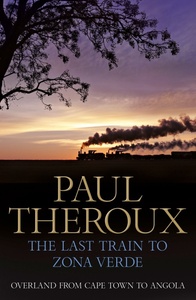Take a photo of a barcode or cover
Paul Theroux paints a realistic, if not bleak at times, picture of modern-day Africa. His account of his experience in Angola was especially interesting because I really did not know much about that country. In most of Africa, there seems to be a huge discrepancy between the haves and have-nots, and this seems especially true in the politically-corrupt Angola. In the end, Theroux does come off as a bit jaded with the African continent, and frustrated with the corruption and lack of resources for the poor. I wished that he had identified what can be done to help countries like Angola a little more clearly, but I suppose that wasn't the point in his writing.
This is the first book I've read by Mr. Theroux and now I want to read some others. Although he'd been to Africa multiple times before, this trip is a solo traveler's adventure up the western part of Africa. He examines tourism, lost of a way of life (Bushmen), wildly out of control wealth inequality, results of African colonialism, celebrity meddling to stroke their egos, and quite simply what he experiences on his trip. There are some ironies involved as when he discusses tourism in Capetown's shantytowns (slumming) and yet he is doing it himself throughout the book to gain an authentic experience. Granted, he explains especially later on in the book, that the desperate poor in their squatters' camps becomes overwhelming and reaches the point where he simply does not want to see any more. I don't blame him. My takeaway from this book is the horrifying results of government/national leadership caring nothing about their populations, leaving them to their own misery and idleness. Some of the countries he traveled in, he believes to be very wealthy--oil rich and diamond rich. The leaders have extravagant lifestyles while the population starves and lacks even the most basic necessities.
Paul Theroux returns to the continent where it all started for him, Africa, intending to travel overland from Cape Town to Cairo. South Africa and Namibia offer some hope and the chance for Theroux to tell us about himself as he writes about the places he goes and people he meets. The oil rich, dirt poor kleptocracy that is Angola makes him rethink the journey. While he's come to the end of the line in Africa, Theroux took a trip through the South and wrote a book about it that I'll read.
I haven't read any Theroux for a long time, probably since his paddle around the Pacific. I hadn't missed his grumpy, misanthropic tone, but this book reminded me what a great writer and observer he is. It's hardly a bundle of laughs -- returning to his beloved Africa he finds that almost everything has got worse, and he gets increasingly weary and cynical during a very difficult journey. But each chapter is a beautifully constructed piece in its own right: the chapter about the Ju'/Hoansi bushmen is masterly in its progression from joy to disillusionment. And Three pieces of chicken could be a short story. You don't have to agree with his trenchant views on aid to Africa to appreciate his work and the breadth of experience he brings to it.
The end of his journey, in Angola, is apocalyptic: "This is what the world will look like when it ends", says a recently-met Angolan friend who will die within a couple of weeks. Theroux gives up hope of reaching Timbuktu and returns home. I felt both sympathy and admiration for him, undertaking such a trip alone at 70, relying on the kindness of strangers in places where life is nasty, brutish and short for most people.
Some striking images: in Angola, "a shrieking, chaotic, reckless society on the brink of extinction", an American teacher recounts meeting a Portuguese couple who had emigrated to Mozambique forty years earlier. It must have been hard to adjust, she said. Not really, they replied: "We came from a poor village in Portugal ... in Mozambique we had electricity and running water for the first time." What a comment on the colonial power! While Theroux was there, the Portuguese prime minister visited Angola, run by billionaires and home to some of the most destitute people on the planet, to beg for a loan for his bankrupt country.
Imagining being killed in a car crash in the zona verde (a high probability), Theroux laughs bitterly at the phrase "He died doing what he loved" -- said of someone he'd met weeks earlier, trampled to death by an elephant. He knows he will not return to Africa.
The end of his journey, in Angola, is apocalyptic: "This is what the world will look like when it ends", says a recently-met Angolan friend who will die within a couple of weeks. Theroux gives up hope of reaching Timbuktu and returns home. I felt both sympathy and admiration for him, undertaking such a trip alone at 70, relying on the kindness of strangers in places where life is nasty, brutish and short for most people.
Some striking images: in Angola, "a shrieking, chaotic, reckless society on the brink of extinction", an American teacher recounts meeting a Portuguese couple who had emigrated to Mozambique forty years earlier. It must have been hard to adjust, she said. Not really, they replied: "We came from a poor village in Portugal ... in Mozambique we had electricity and running water for the first time." What a comment on the colonial power! While Theroux was there, the Portuguese prime minister visited Angola, run by billionaires and home to some of the most destitute people on the planet, to beg for a loan for his bankrupt country.
Imagining being killed in a car crash in the zona verde (a high probability), Theroux laughs bitterly at the phrase "He died doing what he loved" -- said of someone he'd met weeks earlier, trampled to death by an elephant. He knows he will not return to Africa.
This book was given to me by my mom for Christmas after she told me that Paul Theroux was her mom's favorite travel writer. This book is written as a quasi-sequel to Theroux's most famous work, Black Star Safari, where he chronicled his journey from Egypt to South Africa. Last Train to Zona Verde picks up where Black Star left off and has Theroux return to South Africa ten years later. From there, he goes into the countries of Namibia and Angola, describing both the culture and history of these West African nations. Reading Theroux gave me flashbacks to my time abroad both in Europe and Kenya and it gave me an appreciation for just how savvy Theroux is to be able to navigate that region. In addition to not only detailing the histories of the countries and regions, Theroux also accurately recounts his conversations so the pace of the novel moves very smoothly. He brings an honesty and humility to the process and he constantly struggles with the idea that he might be too old to be doing what he is doing. The end result is a funny, endearing, poignant look at an African continent that seems stuck in a cycle of corruption where the richest of the rich live the good life while millions of people struggle to get by. For anyone who wants to understand the legacy of colonialism, this book serves as a window into the soul of three separate and unique African nations who are still struggling to adopt to the 21st century.
Despite many poignant moments and overall great writing, the book feels like an afterthought of the preceding one, is a bit tedious at times and Theroux spends a bit too much time apologizing for the ending.
adventurous
dark
emotional
informative
reflective
sad
medium-paced
adventurous
funny
informative
reflective
medium-paced
This was my first foray into Theroux's travel narratives. I had enjoyed some of his fiction (and have had a little trouble getting through some of his other fiction), but I found his travel writing great. Or perhaps it was his route and destination. Angola. A place I'll never go. A reputed hellhole. A war torn area run by bandits, dictators, and communists. A really fascinating read. Illuminates the problems with Africa and how America is connected to that very thing. Makes one extremely thankful for the circumstances of one's upbringing. A great read.
emotional
informative
sad
medium-paced
So here’s the deal: I’m attempting a “Read Around the World” challenge. There are two main “rules”: the primary location has to be that country (so not too much traveling) and the author should be from that country. I and had an extremely difficult time finding literature for Angola that fit my criteria, a fact that the author actually touches on this book. It’s not my first compromise and I know it won’t be the last. I plan to revisit these countries once I’m initially finished to see if I can find anything beyond what I’ve found in my library’s system.
For the time being, I thought this was a decent fit. Paul Theroux is certainly not from Angola, but he spent time there as a young man working as a teacher. He then returns to Africa decades later and spends a large majority of this second trip in Angola. Missed on the first rule but I think it met the second rule.
I learned a lot about Angola, both its history and its current state. Theroux covers a lot of ground, writing about the political, social, and economic issues both past and present. He writes very visually about this country and I believe that he knows what he’s talking about. So yeah, as a “first visit” I’m fairly satisfied.
Ironically, when Theroux first ventured into Angola I did start to lose his intentions behind writing this book. Africa starts out pretty romanticized even though Theroux definitely goes off the beaten path. It was an interesting balance. However, but things take a depressing turn once Theroux enters Angola and the book becomes an intensely detailed account of the extreme poverty, the violent crime rate, and the diseases that the people who live there face on a daily basis.
I don’t take issue with either halves, the problem is that I don’t think they fit together to make a coherent whole. Theroux’s writing is both visual and educational, and I never struggled reading it, I just wish that it was more consistent in its focus.
For the time being, I thought this was a decent fit. Paul Theroux is certainly not from Angola, but he spent time there as a young man working as a teacher. He then returns to Africa decades later and spends a large majority of this second trip in Angola. Missed on the first rule but I think it met the second rule.
I learned a lot about Angola, both its history and its current state. Theroux covers a lot of ground, writing about the political, social, and economic issues both past and present. He writes very visually about this country and I believe that he knows what he’s talking about. So yeah, as a “first visit” I’m fairly satisfied.
Ironically, when Theroux first ventured into Angola I did start to lose his intentions behind writing this book. Africa starts out pretty romanticized even though Theroux definitely goes off the beaten path. It was an interesting balance. However, but things take a depressing turn once Theroux enters Angola and the book becomes an intensely detailed account of the extreme poverty, the violent crime rate, and the diseases that the people who live there face on a daily basis.
I don’t take issue with either halves, the problem is that I don’t think they fit together to make a coherent whole. Theroux’s writing is both visual and educational, and I never struggled reading it, I just wish that it was more consistent in its focus.



